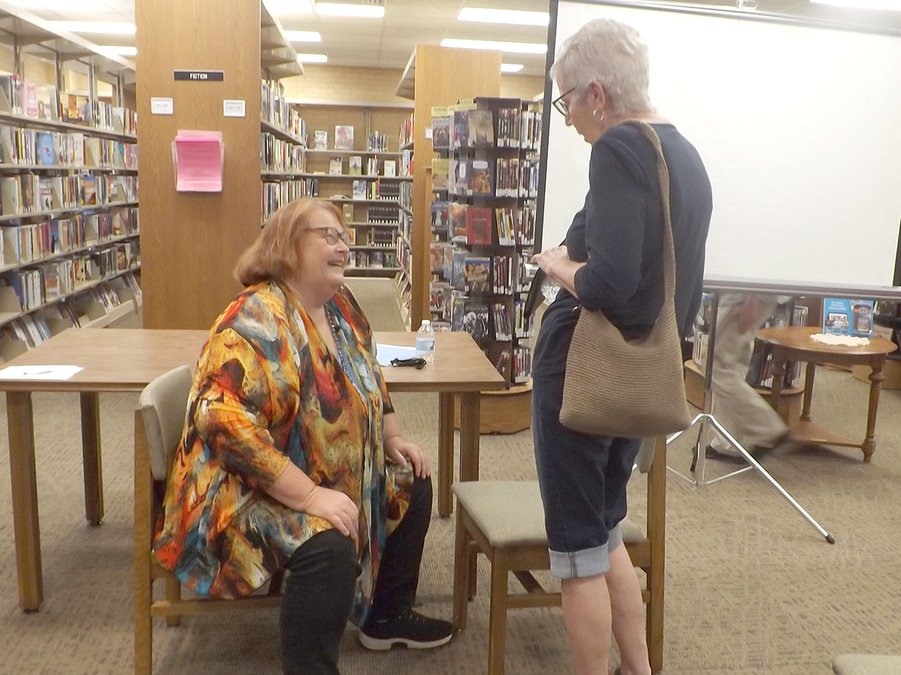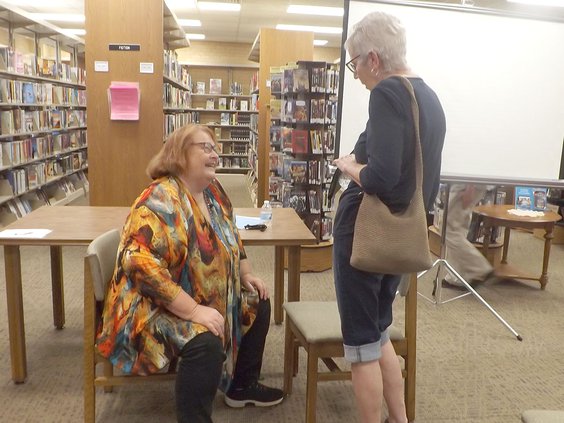HOISINGTON – As St. John native Beccy Tanner spoke to a gathered audience about Depression-era Kansas at the Hoisington Public Library Saturday afternoon, it much more resembled a family living room chat than an academic presentation.
Tanner, a freelance writer and Kansas history teacher at Wichita State University, was the featured speaker at the library’s Humanities Kansas-sponsored presentation, “Dirt, Grit, and Jell-O Salad — How We Survived the Great Depression.” The presentation and interactive discussion was designed to examine how rural Kansans responded to the economic and agricultural hardships of the 1930’s, and what modern Kansans can take from the experiences of their parents and grandparents.
As part of the presentation, Tanner encouraged discussion and participation from audience members, offering them chances to recall their own childhood experiences, and how lessons from them can be brought into a context of today.
The genesis of the presentation, she said, came from the recession of 2008. In a conversation with a trucker for a story at that time, the trucker told her, “I’m not so much worried about me as I am my children. I grew up on a farm, and they don’t know what to do to survive.”
In the 2010 census, she noted for the first time in the state’s history, more Kansans identified themselves as urban dwelling rather than rural. The population shift, she said, has brought about natural changes to the culture and how people interact with their world.
“I’m asking you to think about how that changes things - how that changes our dynamics, and perhaps even values,” she said.
With that, she encouraged questions and discussions on the topics she planned to cover, and by doing so hoped the audience would find common denominators in peoples’ shared experiences.
She opened discussion by introducing the audience her own rural Kansas roots; how her own grandparents, both educators in the town of Radium, began a family in Stafford County in the midst of another global pandemic at the end of World War I, and how her family made it through one of the most challenging economic times in the state’s - and nation’s - history.
“I was always fascinated growing up by my grandparents’ and parents’ stories of the Great Depression, how they survived the Dust Bowl, and just some of the things that were taking place for them,” Tanner said.
As she began to spin her grandparents’ tales of how Depression-era farmers would find creative ways to help their farms survive during the “Dirty ‘30’s,” she encouraged the audience to think about, and share, their own tales about how their families survived the era, like a story of a farmer and his family who would haul a single tractor eight hours between Stafford and Kearney counties to farm not only their own ground, but others as well.
“(The tractor) would run sometimes 24 hours a day,” she said. “They took turns running it. They had to, (in order) to keep things going.”
As the discussion continued, tales turned to famous, and sometimes infamous, Kansans with ties to the area who left their marks on the nation through innovative ideas and practices, such as one of Tanner’s family members, Jesse Shields, who helped the Firestone Tire and Rubber Company develop and test the rubberized tractor tire.
She talked about how in the ‘30’s, cars, electricity and telephone service began to reach rural areas more. Several members of the audience reminisced on stories about the “party lines” which used to connect rural parts of the state.
Stories told often brought humor along with the poignant memories, but all tied to the resilience of rural Kansans from the Depression forward.
The discussion then turned to food, and how many common convenience staples and recipes began as economical ways for families to survive when money and food were scarce. Jell-O, SPAM, bread pudding, boxed mac & cheese, Krispy Kreme donuts, butter crackers, Kool-Aid and more either had their genesis, or found more creative uses, as people worked to make thin food supplies stretch.
Further tales spun towards radio and meteorites, and how Kansans such as Clyde Tombaugh impacted how people viewed the cosmos above them.
Tanner and several audience members noted how many agricultural and household practices which had their roots in the ‘30’s have begun to make a return as people look for more economically and environmentally sustainable ways to survive.
Many skills, some lamented, have become, or are becoming, lost arts in a more technologically-connected world. Many basic life skills, many noted, have gotten lost as more people depend on technology to get by.
As she closed, Tanner hoped the discussion engaged the gathered audience through shared memories.
“I hope we’ve created pictures in your mind,” she said.
For more information about other programs available at the Hoisington Public Library, call the library at 620-653-4128.





